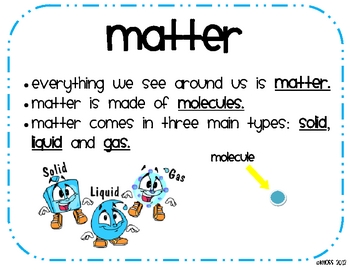Matter

It is very important for elementary students to develop an understanding of matter. Young learners typically have an understanding of solids and liquids as matter, but they may need some support in grasping that air is also matter. Your kiddo may also struggle to understand that “soft" solids like powder, cloth, and paper are solids.
Your kiddo has been learning about the properties of matter. Provide them with some opportunities to measure the following properties:
● Size (Use a ruler to measure height, width, and length.)
● Mass (At this level, it is appropriate to measure weight.)
● Volume (It is easier to measure powders and liquids than solids.)
● Temperature (Use a thermometer or record whether something feels warm or cool to the touch, exercising caution not to burn yourself.)


Provide your kiddo opportunities to measure and compare types of matter based on the properties listed above. Your child should also use the following questions to compare types of matter:
● What is the state of matter? (Is it a solid, a liquid, or a gas?)
● Is the matter magnetic? (Does the matter stick to a magnet?)
● Does the matter sink or float? (What do we notice when we put the matter in water?)
Pick some safe household objects (milk, sugar, paperclips, water, ice cubes, cloth, paper, etc.), and help your kiddo determine the state of matter, whether the object is magnetic, and whether the object sinks or floats.
Help your child understand that all states of water—solid, liquid, and gas—are water. The water particles are the same in each state, but the way those particles move around are different depending on whether they are being heated or cooled.
We will be conducting many experiments this unit. Keep asking your kiddo what they know about matter!
Check out this Crash Course Kids Video:
What's Matter?
Here are some matter games you can play:
Please let me know if you have any questions.


No comments:
Post a Comment